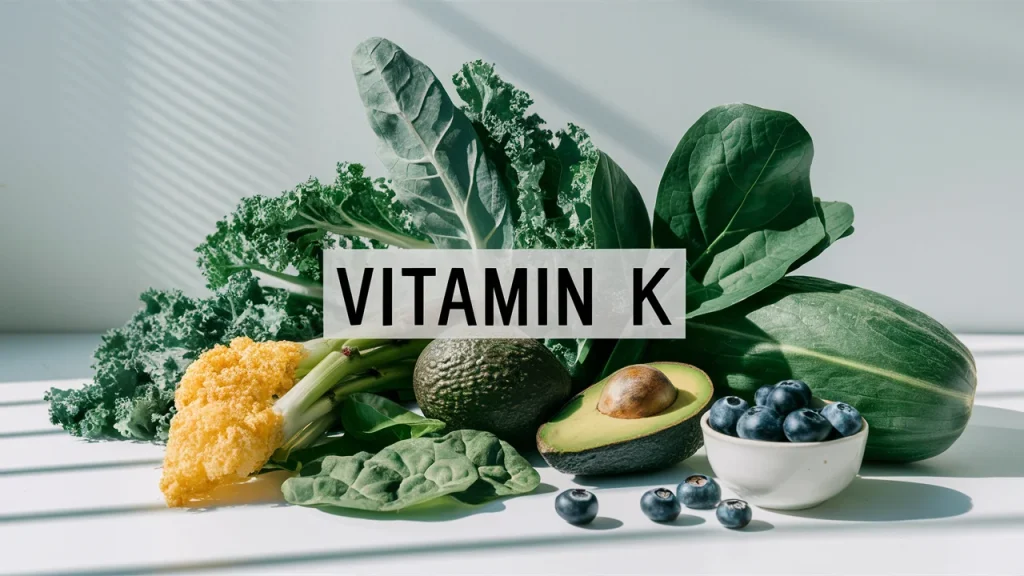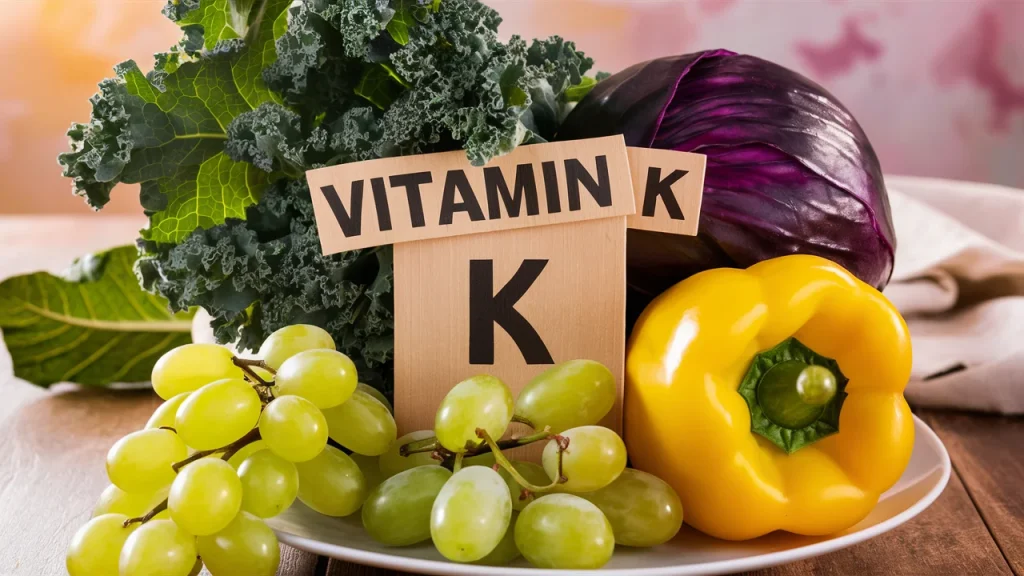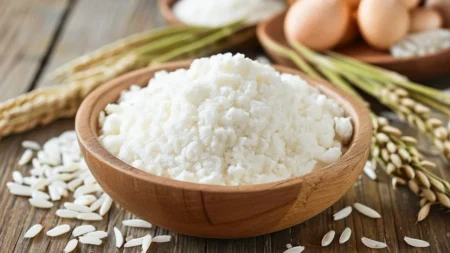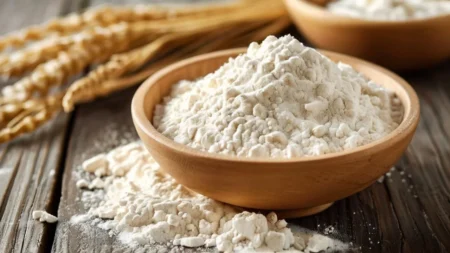Vitamin K is a fat-soluble nutrient that plays a vital role in maintaining strong bones and proper blood clotting. This essential vitamin has two main forms – vitamin K1 (phylloquinone) and vitamin K2 (menaquinones) – each with unique functions and health benefits. Understanding the importance of vitamin K and how to ensure adequate intake is crucial for optimizing your overall well-being.

Key Takeaways
- Vitamin K is essential for maintaining healthy bones and proper blood clotting.
- There are two main forms of vitamin K: K1 (phylloquinone) and K2 (menaquinones).
- Vitamin K1 is found in green leafy vegetables, while vitamin K2 is produced by bacteria and found in fermented foods.
- Adequate vitamin K intake helps regulate calcium absorption and deposition, supporting bone health and preventing osteoporosis.
- Vitamin K is crucial for the coagulation cascade, the process that helps stop bleeding and form blood clots.
The Vital Role of Vitamin K
Vitamin K is primarily known for its role in blood coagulation, helping your body form blood clots to stop bleeding. However, its functions extend far beyond just blood clotting. Vitamin K also plays a crucial role in bone health by regulating calcium absorption and deposition, which is essential for maintaining strong and dense bones. Additionally, emerging research suggests that vitamin K may provide cardiovascular benefits by inhibiting the calcification of blood vessels. Understanding these diverse functions of vitamin K highlights its importance for overall health and well-being.
Understanding Vitamin K’s Functions
Vitamin K is a fat-soluble nutrient that serves several important functions in the body. Its primary role is in the blood coagulation process, where it activates specific proteins necessary for the formation of blood clots. This process helps stop bleeding and prevent excessive blood loss.
Beyond its role in blood clotting, vitamin K also contributes to bone mineralization by activating proteins involved in the regulation of calcium deposition into the bones. This process is crucial for maintaining strong, dense bones and reducing the risk of osteoporosis.
Why Vitamin K Matters for Your Health
The diverse functions of vitamin K make it an essential nutrient for overall health and well-being. Adequate vitamin K intake can help support cardiovascular health by inhibiting the calcification of blood vessels, which can lead to improved blood flow and reduced risk of heart disease.
Furthermore, ensuring you get enough vitamin K is crucial for maintaining bone density and preventing bone loss, particularly as you age. By supporting the proper absorption and utilization of calcium, vitamin K plays a key role in preserving bone health and reducing the risk of fractures.
Vitamin K Forms and Sources
Vitamin K, a fat-soluble nutrient, comes in two primary forms: vitamin K1 (phylloquinone) and vitamin K2 (menaquinones). Understanding the unique characteristics and dietary sources of these two forms can help ensure you’re getting the optimal amount of this essential vitamin.
Vitamin K1 (Phylloquinone)
Vitamin K1, also known as phylloquinone, is the most common form of vitamin K. It is primarily found in green leafy vegetables, such as kale, spinach, and broccoli. These nutrient-dense foods are excellent dietary sources of vitamin K1, providing the body with the necessary building blocks for proper blood clotting and bone health.
Vitamin K2 (Menaquinones)
In contrast, vitamin K2, or menaquinones, is produced by bacteria and is found in fermented foods like natto, cheese, and certain meat products. While both forms of vitamin K are important, research suggests that vitamin K2 may be more effective at supporting long-term bone health and cardiovascular function compared to vitamin K1.
By incorporating a variety of vitamin K-rich foods, including both dietary sources of vitamin K1 and vitamin K2, you can help ensure your body is receiving the necessary amounts of this essential nutrient for optimal health and well-being.
Vitamin K and Bone Health
Vitamin K plays a crucial role in maintaining strong, healthy bones. It works by activating certain proteins that are essential for calcium regulation and bone mineralization. This process helps to ensure that calcium is properly deposited into the bones, rather than accumulating in the soft tissues or arteries. Adequate vitamin K intake has been linked to a reduced risk of osteoporosis and a lower likelihood of fractures, making it an important nutrient for supporting long-term bone health and preventing age-related bone loss.
Calcium Regulation and Bone Mineralization
Vitamin K plays a crucial role in the process of bone mineralization, which is the deposition of calcium and other minerals into the bone matrix. By activating specific proteins, vitamin K helps to ensure that calcium is properly utilized and incorporated into the bones, rather than being deposited in other areas of the body. This process is essential for maintaining bone density and overall bone health.
Preventing Osteoporosis
Numerous studies have demonstrated that adequate vitamin K intake is associated with a reduced risk of osteoporosis and a lower likelihood of fractures. Vitamin K supports the activity of osteocalcin, a protein that plays a key role in bone mineralization and bone density. By promoting the proper utilization of calcium, vitamin K helps to prevent bone loss and maintain the strength and integrity of the skeletal system.
| Benefit | Explanation |
|---|---|
| Calcium Regulation | Vitamin K activates proteins essential for proper calcium deposition in the bones, preventing its accumulation in soft tissues. |
| Bone Mineralization | Vitamin K supports the process of bone mineralization, ensuring calcium and other minerals are effectively incorporated into the bone matrix. |
| Osteoporosis Prevention | Adequate vitamin K intake is linked to a reduced risk of osteoporosis and lower likelihood of fractures by promoting bone density and strength. |
Vitamin K and Blood Clotting
One of the most well-known functions of vitamin K is its pivotal role in the process of blood coagulation, also known as blood clotting. This fat-soluble nutrient is essential for the activation of several key proteins involved in the coagulation cascade – the series of chemical reactions that ultimately lead to the formation of a blood clot.
The Coagulation Cascade
When you experience a cut or injury, the coagulation cascade is triggered, and vitamin K-dependent proteins play a crucial part in this process. These proteins help to initiate the clotting process, promoting the conversion of prothrombin to thrombin, which then facilitates the transformation of fibrinogen into fibrin. This fibrin network traps blood cells, platelets, and other components, ultimately sealing the wound and preventing excessive blood loss.
Balancing Clotting and Bleeding
While the blood clotting abilities of vitamin K are essential for your health, it’s crucial to maintain a delicate balance between clotting and bleeding. Too much vitamin K can lead to an increased risk of blood clots, while too little can result in excessive bleeding or hemorrhaging. This is particularly important for individuals taking anticoagulant medications, who may need to carefully monitor their vitamin K intake to avoid potential complications. Maintaining adequate, but not excessive, levels of vitamin K is key to ensuring optimal blood coagulation and overall cardiovascular health.
FAQ
What is the importance of vitamin K?
Vitamin K is a crucial nutrient that plays a vital role in maintaining strong bones and proper blood clotting. It is essential for activating proteins involved in calcium regulation, bone mineralization, and the coagulation cascade.
What are the two main forms of vitamin K?
Vitamin K comes in two primary forms: vitamin K1 (phylloquinone) and vitamin K2 (menaquinones). Vitamin K1 is primarily found in green leafy vegetables, while vitamin K2 is produced by bacteria and found in fermented foods.
How does vitamin K support bone health?
Vitamin K helps regulate calcium absorption and deposition, ensuring that calcium is properly incorporated into the bones. This process is essential for maintaining strong, dense bones and reducing the risk of osteoporosis and age-related bone loss.
What is the role of vitamin K in blood clotting?
Vitamin K is essential for the activation of several proteins involved in the coagulation cascade, the process that leads to the formation of blood clots. This helps stop bleeding and prevent excessive blood loss. However, it’s important to maintain a balance between blood clotting and bleeding, as too much or too little vitamin K can lead to potential health problems.
What are the dietary sources of vitamin K?
The primary dietary sources of vitamin K1 (phylloquinone) are green leafy vegetables, such as kale, spinach, and broccoli. Vitamin K2 (menaquinones) can be found in fermented foods like natto, cheese, and certain meat products.
Who is at risk of vitamin K deficiency?
Individuals on long-term anticoagulant therapy, infants, and those with certain medical conditions, such as malabsorption disorders or liver disease, may be at a higher risk of vitamin K deficiency. This can lead to increased bleeding and a higher risk of bone-related health issues.
Can vitamin K supplements be beneficial?
Vitamin K supplements can be beneficial for individuals who are unable to obtain sufficient amounts of this nutrient from their diet, such as those on anticoagulant medications or with certain medical conditions. However, it’s important to consult with a healthcare professional before starting any supplement regimen, as vitamin K can interact with certain medications.











